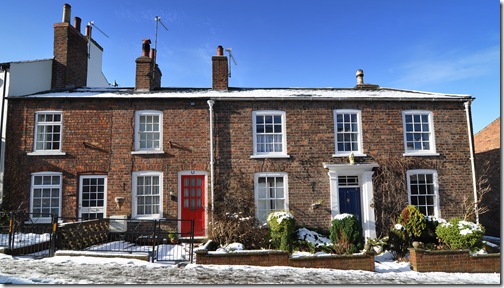How much space do we need to live well? I was confronted by that question in Chapel Street, Caistor last Friday. I had just taken the photograph of 'comedy and tragedy', the striking decoration which adorns the white house just to the left of shot in this picture of the attractive Georgian terrace. As I stood looking at the houses I noticed their relative proportions. The end of terrace to the right occupies roughly double the space of the two to its left. Turning 90deg to the right I then pondered the imposing frontage of the three-storey house in the second shot, a property which stretches way back beyond the road.
I wonder what life was like for the first occupants of these homes? Without going all Dickensian I am struck by the socio-economic story that these houses seem to tell and the markedly different answers to the question 'how much space do they need' each offers.
Notice that I have re-phrased the question. It is now a power question which betrays a determining authority. Growing up in the Black Country I was used to seeing streets of terraced 'two up, two down' houses. They were very common. This was where the working class lived and died. The grander houses were the preserve of upper class old money, landed gentry and aspirational industrial entrepreneurs - the factory owners. One set of people need this much space, and we can squeeze so many units of this size onto that piece of land. Another more privileged group clearly thought that they needed much more space, double in fact, and were spared this confining determinism. And so on until the amount of space 'needed' is vast. Think Chatsworth House, Blenheim Palace, Holkham Hall. Whilst some barely survived in their small given space, others lived inconceivably well in their capacious, privileged splendour.
Those who determined that their workers could live in back to back streets of terraces would, of course, never be content or indeed able to cope in such limited space themselves. Status and position in society were directly reflected in bricks, mortar and servants. The same type of mind-set is rampant today. Identity and worth are relativised into the consumerist calculus of extravagance and excess. This unsustainable capitalist con-trick is the road to ruin. The space needed to live 'well' has become a very moot point in these carbon conscious times.
So to the disparity in the space needed to live well we now have to add a further, critical dimension, that of ecological footprint. At its most chilling this measure shows how many planets just like earth we would need to support a given consumption lifestyle if this was shared by everyone on earth. Our small planet cannot support our current lust for capacious, resource hungry living.
The determining authorities of the World Economic Forum who gathered at Davos might helpfully consider downsizing as their most urgent priority. How much space do they think they need to live well? And why is that answer probably so very different to the rest of us? I can't help but think that the question 'How much space do we need to live well?' is a desperately urgent one for us to answer in a radical fashion here in the West. Right around the globe far, far too many people have little space to live at all. Let alone live well. For them there is no comedy, just unremitting tragedy. So lets turn the question inside out: How much ecological space can we each occupy in order to build a just future for all God's cherished people?








hmmm, an interesting post, and something I am trying to discuss with others at this time...
ReplyDeleteis space a western luxury, or a necessity?
is space more to do with inner peace and can we therfore find space where this is relatively little physical space?
You ask 'How much space do we need to live well?'
I guess we will all answer that differently. I do know that when we lived in Texas that our neighbours were amazed that we squeezed our family into " that little house"- with its' 4 bedrooms two bathrooms and a cloakroom, etc etc, we had never occupied anything so big!
How much ecological space can we each occupy in order to build a just future for all God's cherished people?
There lies the rub, dare we declutter and downsize... I believe we must, but just how much we can might pose an entirely different question!
I am certain that you are right Sally when you say that inner peace is the key. We can live just as badly in a mansion as in a one-room flat, if we are not at peace. That said, a prison cell isn't exactly conducive to living well, so a sense of spaciousness and freedom is related to physical space and context too. Then we factor in size of family....and the complexity increases! Somewhere in all of this I think is the benefit of having a space which is in some sense our own, a private space, a sanctuary if you will. It can be a desk, a corner of a room, or a room itself. We don't have to own it, but we do need to have determining authority over its use!
ReplyDelete"Somewhere in all of this I think is the benefit of having a space which is in some sense our own, a private space, a sanctuary if you will. It can be a desk, a corner of a room, or a room itself. We don't have to own it, but we do need to have determining authority over its use!"
ReplyDeleteNow that is a very good point, and has given me some food for thought!